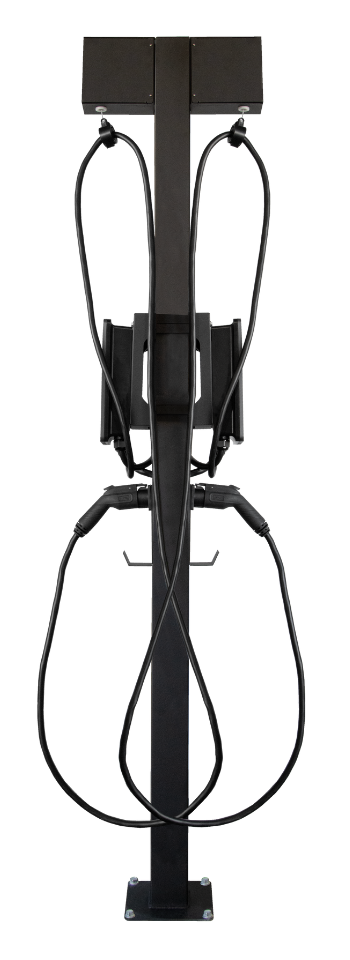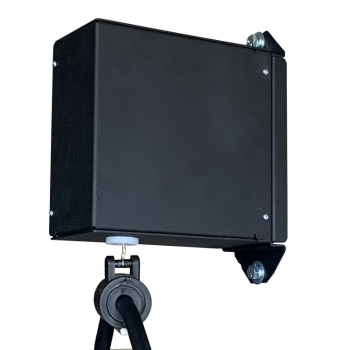We use cookies to make your experience better. To comply with the new e-Privacy directive, we need to ask for your consent to set the cookies. Learn more.
Electric Car Charging Stations as a Business Opportunity
Federal policy calls for electric vehicles (EVs) to take over half the market for new car sales by 2030. To reach that goal, however, we’ll need a lot more EV charging stations — and your company can be part of the transformation. Now is the perfect time to get involved, with $7.5 billion in federal funding earmarked for EV charging infrastructure. 
Installing EV chargers at your facility may help you meet sustainability goals, but that’s not the only reason to make the investment. The fact is, electric car charging stations are a strong business opportunity for commercial operations of all types. Here are the top five business benefits of providing EV chargers for your employees, customers, and EV drivers who could become your customers.
5 Business Benefits of Installing EV Charging Stations
You don’t have to start an EV charging station business to tap into a growing market. Retail parking lots make great locations for EV chargers. Real estate operators can offer EV charging in multi-family units. Industrial facilities can double as EV fleet-charging locations, securing a share of an industry that could reach a value of $15 billion per year by 2030.
In short, EV charging stations offer additional business opportunities for any commercial property owner. Here are five ways EV chargers can help your company succeed, regardless of your core business model.
1. EV charging stations can create a new passive income stream.
The most direct business benefit of an EV charging station is that customers will pay to use them. There are a few business models for monetizing EV chargers:
- Customers can pay by the kilowatt-hour. For Level 2 charging, existing network providers charge anywhere from around a quarter to nearly 80 cents per hour.
- Many EV charger providers bill by time spent plugged in. According to one survey, most EV owners said they’d pay up to $3 per hour for access to a Level 2 charger.
- If you charge for parking, you can offer the option to charge for a fixed add-on fee.
Once you get your EV charger and the accompanying payment infrastructure set up, you have a largely passive source of income. We say “largely” instead of “entirely” passive, because you’ll need to conduct periodic maintenance, manage software, and pay higher electricity bills. But once you have it up and running, it doesn’t take much time to operate an EV charging station on your business property.
That said, many commercial operations offer free EV charging in their lots. The rest of the benefits on this list explain why.
2. EV chargers draw more customers into your business.
Retailers and hospitality businesses have a strong incentive to offer free EV charging to their customers. Level 2 chargers can take hours to get an EV battery back to full power. Even DC fast chargers take up to 45 minutes to reach an 80% state of charge. While drivers wait for their cars to power up, they’re likely to spend time in the nearest business — yours.
That’s been proven by early adopters of EV charging. One retailer noted that customers who used their EV chargers spent an average of 50 extra minutes on-site. That kind of “dwell-time” increase offers your business more time to make a sale, inform customers about your services, or build brand affinity.
And EV drivers make great customers. The Fuels Institute’s 2021 EV Consumer Behavior Report notes that nearly 60% of EV owners earn more than $100,000 per year. That’s a lot of disposable income. By offering EV charging at your location, you can funnel some of it toward your business.
3. EV charging stations are listed on popular navigation apps, boosting your brand’s visibility — online and off.
On average, businesses devote 56% of their marketing budgets to online channels. EV chargers can help with this effort without additional costs (beyond installing and operating the chargers, of course).
How? There are a number of apps that show EV drivers to the nearest charger. For example, EV owners may rely on: PlugShare, ChargeHub, or Chargemap to find EV charging stations. But even Google Maps — the most-downloaded navigation app in the U.S. — allows users to search for EV chargers.
So, installing EV chargers outside your facility literally puts you on the map — multiple maps, in fact. That can give your business a powerful visibility boost.
4. Free charging contributes to greater employee satisfaction.
In 2015, the U.S. Department of Energy launched the Workplace Charging Challenge. The program partnered with employers to install EV chargers for employee use. The results were overwhelmingly positive, with 90% of participating businesses saying staff appreciated the capability. And employees at businesses that participated in the program were six times more likely to drive an EV than the typical worker.
In 2022, more than 40% of U.S. adults said they were likely to make their next vehicle electric. As the share of EVs on the road increases, so do the odds your employees will be driving them. Free charging at the workplace can help keep these employees happy, reducing turnover for a more effective operation overall.
5. EV chargers demonstrate a commitment to sustainability, which can improve brand affinity.
No matter what industry you’re in, a decent portion of your customers are passionate about sustainability — and they’re willing to pay more for brands that strive to reduce environmental impacts.
A 2022 survey found that more than half of consumers care more about sustainability than they did the prior year. Fully half of survey respondents said they’d pay more for sustainable brands. By installing EV charging stations on your property, you make a very visible commitment to environmental stewardship. That makes your brand look good, and it can foster customer loyalty for every EV owner who uses your chargers.
All these benefits are available to business owners who install EV chargers. The only question, then, is how to begin.
EV Charging Stations at Your Business: How to Get Started
New EV charging installations require a bit of leg work and initial investment. The process of installing EV chargers for public use includes a few distinct steps:
- Design and planning for each charging station
- Site preparation and signage
- Electrical infrastructure
- Permitting and compliance with local regulations
- Construction of charging stations themselves
Read more: EV Charging Station Design: 5 Considerations for Fleet Owners
Before you break ground, you must also purchase chargers and support equipment. Here’s the hardware you’ll need:
- EV chargers. Level 2 chargers — which typically take an hour to add capacity worth 20 or 30 miles of operation — are the most common type for today’s workplaces. But you might also choose DC fast charge technology, which can add up to 20 miles of range per minute.
- EV charger stands. It is possible to secure EV chargers to walls — but few parking lots are set up for this approach. Instead, look for weather-resistant, compact charger stands like EV Charger Pedestals from BHS, Inc. This steel, powder-coated stand installs anywhere, providing dependable support and protection for charging equipment.
Read more: What Are EV Pedestals? Understanding EV Charger Support Equipment

- Charger cable management tools. The National Electrical Code requires EV charging installations to include cable management equipment if charging cables exceed 25 feet (7.5 meters). But keeping cables elevated, organized, and easy to access is essential for shorter lengths, too. EV Charger Cable Retractors from BHS, Inc. lift charger cables with a retractable reel line, protecting them without limiting access. Models are available for wall-mounted or stand-mounted chargers — and every BHS EV Charger Pedestal comes with pre-integrated Cable Management Kits, featuring the EV Charger Cable Retractor.
Read more: EVSE Cable Management: Compliance With Safety Standards and Regulations
Electric car charging stations offer new business opportunities for companies of all sizes and descriptions. You just have to commit to the project. To learn more about installing EV chargers at your workplace, see the Alternative Fuels Data Center’s resource page. And for help choosing support equipment for your EV charging station, contact BHS, Inc. at 1.800.BHS.9500 today.
